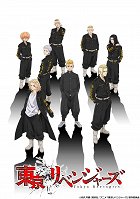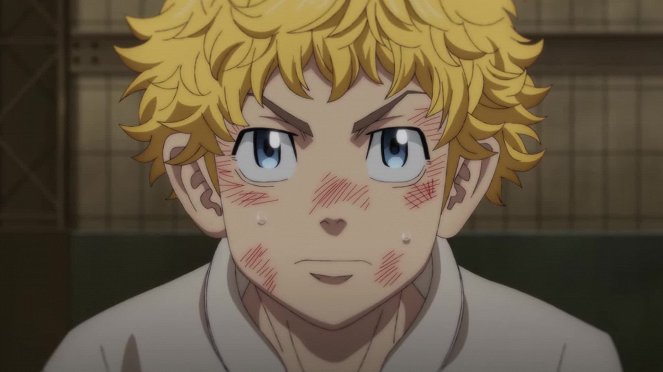Photographie:
Mitsuyoshi YamamotoMusique:
Hiroaki TsutsumiActeurs·trices:
Yūki Shin, Azumi Waki, Ryōta Ōsaka, Tatsuhisa Suzuki, Takuma Terashima, Yuuya Hirose, Shunsuke Takeuchi, Shota Hayama, Satoshi Hino, 水中雅章, Yū Hayashi (plus)VOD (2)
Saisons(3) / Épisodes(50)
-
Season 1 (2021) - 24 épisodes
-
Seija kessen-hen (2023) - 13 épisodes
-
Tendžiku-hen (2023) - 13 épisodes
Résumés(1)
Après être remonté douze ans en arrière, pendant ses années de collège (les meilleures années de sa vie), Takemichi réécrit l'histoire en faisant des choix différents afin de sauver sa chérie dans le futur. (Disney+)
Critique de l’utilisateur·trice Jeoffrey pour cette série (3)
Season 1 (2021) (S01)
I liked Tokyo Revengers, it is set in an interesting world, has a good concept, even if it is just another variation on "Save the Cheerleader, Save the World" again, and likable characters. It also successfully shows which things in life are worth fighting for, and the reasons why you should never run away from a fight, even though you might not have any chance of winning. After all, Takemichi is not the strongest or smartest character in this anime series, he just has a certain way of bringing about change, and his likable stubbornness and occasional belief that you can break through walls with your head earned my admiration. There are two things I cannot quite figure out which do perhaps annoy me a little though. First, censorship: I find it silly to censor certain symbols that can represent a certain thing just because it was misused in the past and added another meaning to it. Talking of swastikas, I think it is wrong to confuse two different things and make a symbol taboo just because a bunch of crazy bastards once appropriated it, especially when its original meaning was so completely different and is also used for completely different reasons in this anime series. In truth, I have never even understood some countries’ censorship of swastikas in the game Doom, where they were used for their Nazi connections, however, just occasionally and logically in context, having a rightful place in the game. I think that this global effort to avoid pissing people off and be as politically correct as possible is really over the top and also stupid sometimes. The second thing is how this show presents time travel itself. If I go into the past and change something in it, and it changes my future, then if I go back to the future, I should be affected there too, right? Here it works in too much of a straightforward way, the protagonist goes back to the past, changes something, comes back, and has no idea what the consequences of those changes were. His present self is completely psychologically unaffected by it. On the one hand, this gives this anime series a certain air of mystery, where no one, including the main protagonist, has any idea of what things are going to be like back in the present; on the other hand, I just cannot seem to bring myself to be truly immersed in, and to fully trust such a concept of time travel. What I find equally strange is how Naoto (mis)perceives these changes. If I wanted to go into more depth, then I would probably get into the details, and would notice some of those paradoxes (if I can figure out the reason for me going back, which then never actually occurs in the past, then has the actual journey into the past ever happened?) Of course, what I know about time travel could be written on my fingernail. Despite that, Tokyo Revengers is a good emotional drama series that is worth watching and I have no problem in awarding this eight out of ten and I am looking forward to the second season because irreversible fate is irreversible fate!
()
(moins)
(plus)
Seija kessen-hen (2023) (S02)
Is the second season better than the first? I don’t think so. It’s still the same thing, with the protagonist being the main driving force of the story. His determination is something to be admired. He keeps trying to (un)successfully break through the wall with his head or at least cry his way to a better future but the writers just won’t let him. He hasn't yet realized who or what the real danger is, that is, whom he’s supposed to stop. The second season at least makes some progress on that front. There are some hints about Kisaki's motivations, and we find out that he's not the only one who can screw things up in the future. The show offers a few answers and some food for thought, so I wasn’t bored in the least. Granted, it was all just a big family drama with darker undertones, but powerful enough for me to enjoy the series. I’m giving it an 8/10 again and I'm curious to see what the already-announced Tenjiku Hen will bring.
()
Tendžiku-hen (2023) (S03)
Best season of Tokyo Revengers, featuring the highest stakes, the greatest dangers, and the most sacrifices. Our hero is at the top of his game, and I thoroughly enjoy witnessing his unwavering determination. Finally delving into the main antagonist's motivation is intriguing, but the series falls short in evoking any pity for him. Kisaki stands as an example that while genius is admirable, lacking empathy can be a downfall. Izana, though not as impactful as Taiju from the previous season, brings an interesting aspect to the story. However, what didn't sit well with me, or rather left me genuinely disappointed, was how Takemichi's secret was revealed to the others. Anticipating it had to happen, I expected a better execution. The ending feels somewhat abrupt, hinting at a possible continuation, but I'm unsure what extensive issues they still aim to address. Despite this, the season was eventful, delivering several unexpected surprises — a solid drama overall. I'd rate it 8.4/10, marking it as the best season of Tokyo Revengers, but it narrowly missed a 5-star rating from me.
()

